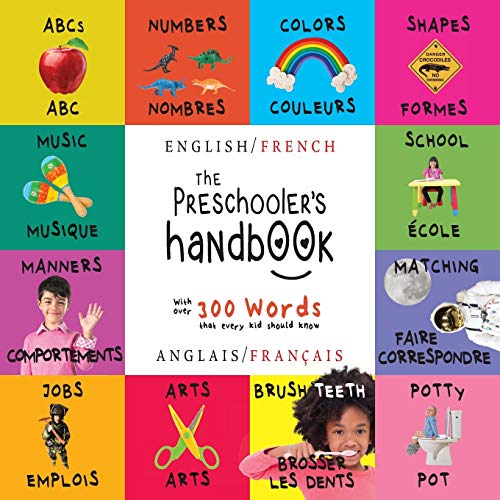
The 5 Best French Dictionaries for Kids
Kid-friendly French dictionaries are a great option for young learners.
They’re visual, engaging and easy to use. They include lots of pictures for easy memorizing and enjoyable reading, among several other benefits.
In this post, you’ll learn about five useful French dictionaries for kids, including both print dictionaries and digital options.
Contents
- 1. “The Preschooler’s Handbook”
- 2. “French-English Picture Dictionary”
- 3. “Children’s Visual Dictionary: French-English”
- 4. “First Words Sticker Book: English-French”
- 5. Little Explorers Bilingual Online Picture Dictionary
- Benefits of French Dictionaries for Kids
- How to Use French Dictionaries for Kids
- And one more thing...
Download: This blog post is available as a convenient and portable PDF that you can take anywhere. Click here to get a copy. (Download)
1. “The Preschooler’s Handbook”
This bilingual French-English handbook is handy for learning more than just basic words. It features fundamental concepts like colors, shapes and matching, and fosters counting skills in both languages.
The book first teaches the alphabet in both upper-case and lower-case letters. A picture of an English-language word (with its French counterpart, including its indefinite article) represents each respective letter of the alphabet.
Using color photos and bright illustrations, this dictionary can add over 300 words to your child’s French vocabulary. The words are arranged in basic categories such as emplois (jobs), école (school), formes (shapes) and comportements (manners).
2. “French-English Picture Dictionary”
The charming color illustrations in this 48-page volume are reminiscent of children’s storybooks.
It starts out with a table of the French alphabet, pairing the upper- and lower-case letters with simplified French phonetic pronunciations. The book also covers number words ranging from 1 to 20 (in English and French, with corresponding numerals).
Each section in the main part of the book is devoted to a specific topic, like le corps (the body) or la cuisine (the kitchen). All told, over 35 topics and 350 words are covered.
3. “Children’s Visual Dictionary: French-English”
The drawings in this visual dictionary aren’t fanciful but photorealistic, which makes sense for a reference book that includes modern technology such as le portable (mobile phone).
Over 1,000 words and phrases are given in French and in English. The words are categorized into 10 topics including people, food, animals, entertainment and more. A multi-page index can help you find specific terms more quickly.
The images included for each word are in the form of a picture, illustrated scene or a useful labeled diagram to show how the words are related.
4. “First Words Sticker Book: English-French”
This dictionary will catch your kid’s attention and keep new words cemented in their memory.
The bilingual book binds together more than 200 words with over 100 fun, reusable stickers. The words are arranged thematically, so related words can be learned together in logical groupings.
The whimsical stickers are each cut into the respective shape of the object they represent, which might facilitate visual recognition. The dictionary also includes colorful double-page illustrations of everyday scenes to introduce the words in a familiar, visual way.
5. Little Explorers Bilingual Online Picture Dictionary
Little Explorers is a magical online passport to new French words. It includes an alphabetical list of word categories, including everything from “devices” to “astronomy.”
Kids can also browse individual words by clicking on the letters in the rainbow-colored alphabet strip. A few links within the word entries provide access to further information and related activities, although some extras require a site membership to fully unlock.
Whether your child chooses to look up words in the English-to-French dictionary or its French-to-English counterpart, there are over 1,400 words to explore.
Benefits of French Dictionaries for Kids
- They cover the basics. Standard dictionaries provide a lot of useful information but can be confusing for beginners and children who are still learning the basics. Kids’ dictionaries help paint broader pictures to help readers learn basic words in everyday usage without getting lost.
- They’re full of images. The illustrations depict words in a more concrete way than a traditional, text-based dictionary. They can act as a universal key to unlock a child’s understanding, even from a very young age. For adults, learning words with pictures means that you won’t be translating words back and forth in your head, so you can achieve fluency faster.
- They follow a logical learning process. Words are often introduced by category, which is a more intuitive way to encounter them than the alphabetization found in standard dictionaries. Introducing words in context also reinforces word relationships. When children see how words branch off from one another, they learn to associate related words.
How to Use French Dictionaries for Kids
How can kids practice new words from their French dictionaries? There are several dynamic options.
Use the dictionary during storytime.
French kids’ dictionaries aren’t just for use in isolation. Your child can see their new words in action when you introduce them to French children’s books, short stories for kids, cartoons, animated films and other media.
Ask them to point out words that they recognize from their dictionary. Is the word used in a different way in the story? Is there a picture in the story that reminds them of other words they know from their dictionary?
And are there words they don’t recognize yet? Encourage them to use their dictionaries to help them understand the stories better!
Create flashcards with new words.
If you have the time and inclination, help your child create flashcards with their dictionary words. Pictures in old newspapers or magazines can be repurposed to illustrate the cards.
Once you have a dozen or so cards ready, make a game out of quizzing each other with them. And don’t forget to keep adding cards to your child’s collection as they learn new words.
If you need tips on how to create your own flashcards or where to buy a set, check out this post.
Combine them with an online learning program.
French dictionaries for kids offer a great way for your child to learn new words. But they need to continue to see them in context to really grasp their meaning and add them to their vocabulary.
To reinforce their learning, you can pair a dictionary with an immersive and interactive learning program like FluentU.
FluentU takes authentic videos—like music videos, movie trailers, news and inspiring talks—and turns them into personalized language learning lessons.
You can try FluentU for free for 2 weeks. Check out the website or download the iOS app or Android app.
P.S. Click here to take advantage of our current sale! (Expires at the end of this month.)
With these French kids’ dictionaries, your petit écolier (little school child) can become an even smarter cookie.
And you can learn a little extra French yourself!
Download: This blog post is available as a convenient and portable PDF that you can take anywhere. Click here to get a copy. (Download)
And one more thing...
If you like learning French on your own time and from the comfort of your smart device, then I'd be remiss to not tell you about FluentU.
FluentU has a wide variety of great content, like interviews, documentary excerpts and web series, as you can see here:

FluentU brings native French videos with reach. With interactive captions, you can tap on any word to see an image, definition and useful examples.

For example, if you tap on the word "crois," you'll see this:

Practice and reinforce all the vocabulary you've learned in a given video with learn mode. Swipe left or right to see more examples for the word you’re learning, and play the mini-games found in our dynamic flashcards, like "fill in the blank."

All throughout, FluentU tracks the vocabulary that you’re learning and uses this information to give you a totally personalized experience. It gives you extra practice with difficult words—and reminds you when it’s time to review what you’ve learned.
Start using the FluentU website on your computer or tablet or, better yet, download the FluentU app from the iTunes or Google Play store. Click here to take advantage of our current sale! (Expires at the end of this month.)





